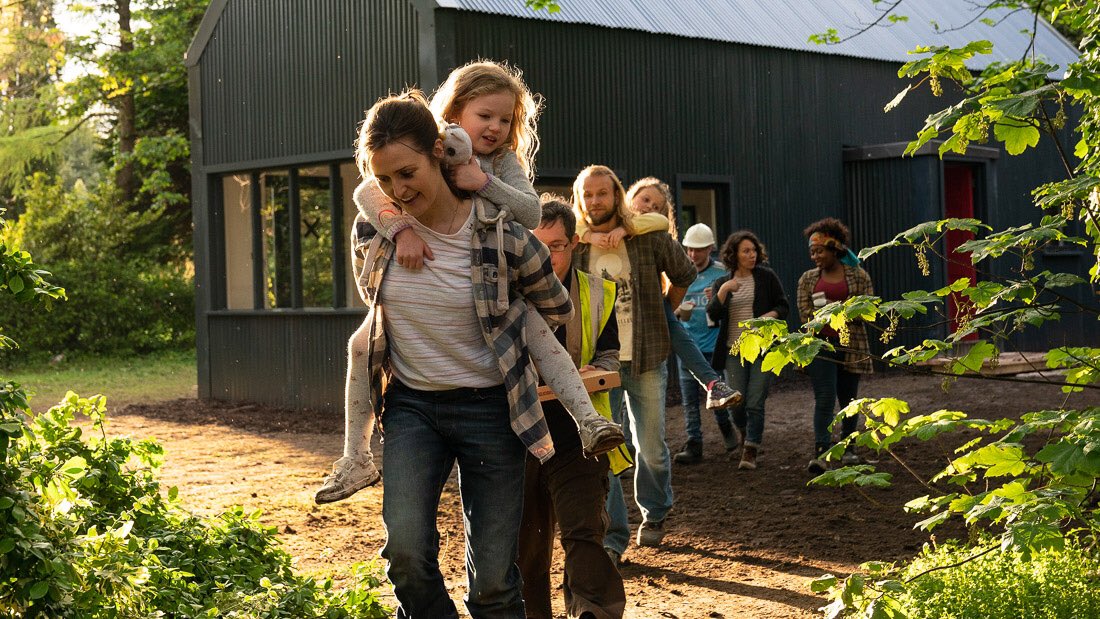|
Herself (2020) Home is a place of inspiration and community in Phyllida Lloyd’s emotional new film, Herself. The story follows Sandra (Clare Dunne) in search of a new place to live, having just escaped from her abusive partner Gary (Ian Lloyd Anderson) with her two young daughters Molly (Molly McCann) and Emma (Ruby Rose O’Hara). Fighting against the housing crisis in Dublin, she stumbles onto the inexpensive idea of building her own home. Determined to prevail, Sandra sets her mind to rebuilding a new life for herself and her children, while reliving the long term trauma of past incidents. The story originated from one of the film’s co-writers and stars, Clare Dunne, who gives a stunning performance of resilience and pours her heart into bringing a meaningful journey onto the screen.
The effective little universe that Sandra has created between her children is clear from the first scene of this film. As a self-protective mechanism in a toxic environment of domestic abuse, the three of them live in their own bubble of love, trust, code words, and secrets that Sandra teaches them to keep. After she and the girls escape from a violent incident, she finds a temporary home with Peggy (the great Harriet Walter), a doctor she cleans for. Peggy had formed a strong friendship with Sandra’s late mother, and this bond leads to a generous offer of land for Sandra to build her home on. Along the way, Sandra runs into and enlists help from Aido (Conleth Hill), a building contractor who agrees to supervise and then brings a group of volunteers on board. It’s heartwarming to watch these characters rally around Sandra and lift her spirits with a powerful sense of community. But while Sandra is rebuilding her life, she’s also having to deal with challenges brought upon by her possessive ex, who insists he’s getting help and wants them to be a family again. What resonates most about Herself is that the screenplay transcends in portraying Sandra as a woman who determines her own fate as a survivor. The film addresses the aftermath of escaping an abusive partner and how Sandra is left to essentially put her life back together, piece by piece. The power of teamwork and resilience shine through the screen, particularly in the second half of the film which lays the foundation for a reaffirming chapter in Sandra’s life. Dunne and co-writer Malcolm Campbell bring such care and thoughtful focus to the character of Sandra. The film shines an introspective light on the strength she is rebuilding within herself; after each setback she experiences, there’s an immediate feeling of hopefulness for her to rise again. Phyllida Lloyd’s strong direction compliments a heartbreaking performance by Clare Dunne at the center. As much as Sandra pushes forward, what resides within her are painful flashbacks to a particularly brutal moment that happens early on in the story. It’s an emotional rollercoaster to watch this character regain her sense of self and shield her children from increasingly challenging moments, one of which sees Sandra at a hearing where custody of her children is under review. The judge asks why she didn’t leave her ex, never asking why he didn’t stop. Dunne’s performance reaches new heights in this devastating moment and leaves such a lasting impact. The protagonist’s grounded journey in Herself speaks to the experiences of so many women who are affected by domestic abuse and its long term effects, in addition to the housing crisis and looking for stable environments to live safely in. Universal themes of hope, resilience, and community adorn the structure of this heartfelt story. Accompanying the film is a soundtrack of uplifting pop songs, which become a little too frequently placed in getting the message across but have an understandable intention. What shines above all else is a resonating protagonist and stunning performance by Clare Dunne, whose journey is both heartbreaking and uplifting to watch unfold. Herself releases January 8th on Amazon Prime Video.
0 Comments
Leave a Reply. |
Archives
June 2024
Categories |


 RSS Feed
RSS Feed